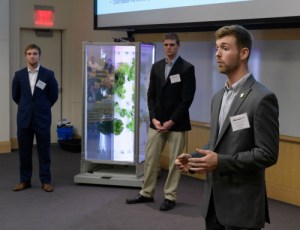John Tolley, August 30, 2017
For people lucky enough to have a home garden, it usually occupies some portion of their yard. People without yards, usually just go without or grow what they can on their windowsill. It?s a circumstance that Purdue University-affiliated startup HydroGrow wants to change.
Recognizing the need for greater agricultural opportunity and the growing desire people have to cultivate their own food, HydroGrow offers consumers a convenient alternative to traditional gardens with their innovative, automated hydroponic system.
Drawing inspiration from NASA experiments into growing fresh food in space, the company is now developing the third version of its Gropod, a self-sustaining device, the size of a refrigerator, which they believe will change the way people eat.
Making use of machine learning algorithms, the Gropod Alpha 3 model detects what plants are growing in its chamber and can adjust the environment accordingly. There is also a corresponding app to allow users to interface with the Gropod using their mobile devices.
Speaking with the Purdue University new service, founder and CEO Scott Massey, a Purdue Polytechnic Institute grad, says that HydroGrow?s mission is about more than growing the perfect tomato. It?s about providing a new agricultural model that works for our ever-growing and ever-changing society.
?By 2050 the population is expected to grow to nearly 9 billion people, doubling the world?s food demand and water consumption,? says Massey. ?Additionally, food deserts affect 23.5 million people in the United States. Half of these people are also low-income so if poorer communities do not have access to fresh produce, they are more likely to have health complications and additional expenses.?
The system uses proprietary seed pods that users simply plug into the device. Through the app, users enter what types of plants they are growing, and the machine calculates the optimal environment. The app then sends out an alert when it is time to harvest the produce.

According to HydroGrow revenue office John Kissel, a junior at Purdue, the system is not only a boon to those looking to grow their own food, but is eco-conscious and time-saving to boot. HydroGrow reduces typical garden waste by 95 percent and can cultivate plants two to three times faster than conventional agriculture.
As HydroGrow approaches its market-ready phase, they are looking to expand, possibly collaborating with hydroponic seed growers across the US to increase distribution. They are also seeking new outlets for funding to add to the over $80,000 they?ve acquired through a variety of competitions.
In addition to Massey and Kissel, the HydroGrow team is rounded out by CTO Ivan Ball and Lead Software Engineer James Carlson.







